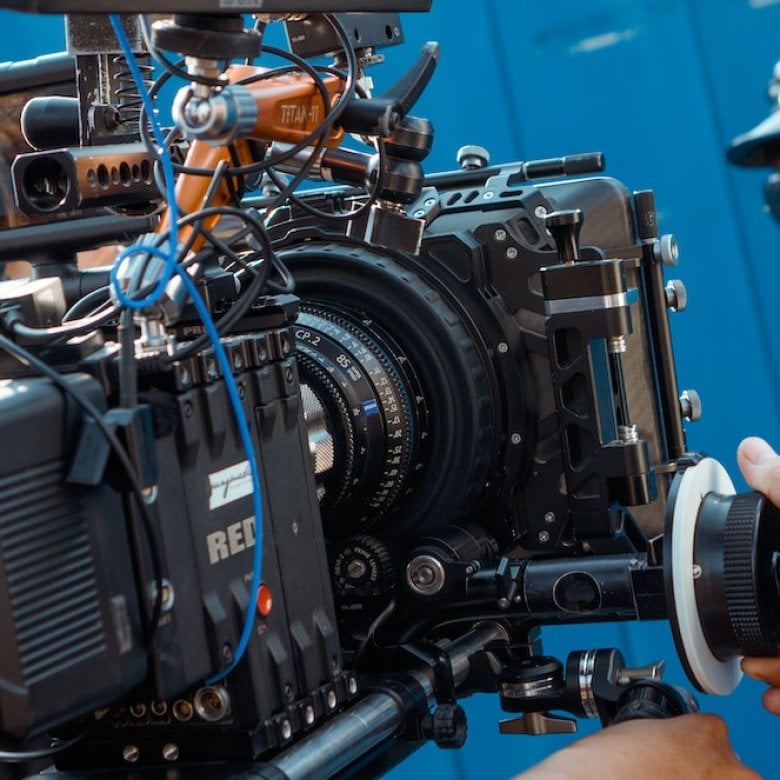How technology has changed the film industry
17 July 2023

The impact of technology on the world of filmmaking has been nothing short of remarkable. From the rise of remote filmmaking to advancements in post-production software and the widespread popularity of online streaming services, technology has reshaped every aspect of the film industry.
In this article, Dr Jem Mackay, Course Leader of Film & Television MA (Online), explores the profound influence of technology on filmmaking and shares his insights on how emerging technologies such as AI and machine learning are poised to change the landscape even further.
How has technology improved filmmaking over the years?
Technology has revolutionised the entire filmmaking process, enhancing every aspect from production to distribution. Cinematography techniques have been vastly improved with the advent of digital cameras, enabling filmmakers to capture high-quality footage with greater flexibility and affordability. For instance, the emergence of cameras like the RED and ARRI Alexa in the late noughties significantly changed the cinematography landscape, providing filmmakers with exceptional image quality and dynamic range.
Audio technology in filmmaking has also witnessed huge advancements. Sound recording and editing tools, such as digital audio workstations (DAWs) like Pro Tools, have made it easier to capture and manipulate audio elements during production and post-production. The introduction of surround sound and immersive audio formats like Dolby Atmos has enriched the audience's cinematic experience.
Post-production has also experienced a digital revolution, with the rise of software like Adobe Premiere Pro and DaVinci Resolve accessible to everyone. These tools offer sophisticated editing capabilities, visual effects, and colour grading options that were once reserved for big-budget productions.
Another element we can’t ignore is the now seamless integration of computer-generated imagery (CGI) into live-action footage, further expanding creative possibilities in filmmaking.
Technology has also transformed film distribution. The rise of streaming platforms like Netflix, Amazon Prime, and Disney+ have significantly changed the way films reach audiences. These streaming platforms provide independent filmmakers with new avenues for showcasing their work, eliminating the need for traditional theatrical releases and empowering a diverse range of voices.
How has technology helped to facilitate remote filmmaking?
Technology has played a crucial role in facilitating remote filmmaking. High-speed internet connections and cloud-based storage solutions have made it easier for filmmakers to collaborate remotely, wherever they are in the world. Platforms like Frame.io and Vimeo allow for seamless sharing and reviewing of footage, making remote collaboration easier in the filmmaking process.
Streaming platforms provide opportunities for online distribution, helping filmmakers reach a global audience without the need for physical media. The democratisation of distribution channels has allowed independent filmmakers to showcase their work to a wider audience, fostering diverse storytelling and creative expression.
What are the benefits of remote filmmaking?
Remote filmmaking offers several benefits. Firstly, it provides a platform for emerging filmmakers to create and showcase their work, making the film industry more inclusive and promoting diversity in storytelling. Online streaming platforms also offer greater accessibility, allowing audiences to access films anytime, anywhere, and on various devices.
Remote filmmaking also reduces production costs by eliminating the need for physical film stock and expensive post-production equipment. Filmmakers can now shoot, edit, and distribute their work using readily available digital tools, opening doors for independent and low-budget productions.
Online platforms like YouTube, Vimeo, Letterboxd, Reddit and Discord encourage interactive engagement between filmmakers and audiences through comments, ratings, and discussions. This direct connection fosters a sense of community and gives filmmakers the opportunity to receive valuable feedback, enabling them to refine their craft and build a loyal fan base.
What is the future of film technology?
The future of film technology holds exciting possibilities, including emerging technologies like artificial intelligence (AI) and machine learning. AI programs assist in various aspects of filmmaking, such as script analysis, content recommendation, and even automating certain production tasks. Machine learning can also be used to analyse large data sets, for example past box office sales, which in turn helps to inform marketing strategies and audience targeting, guiding filmmakers to reach the right audiences more effectively.
Virtual reality (VR) and augmented reality (AR) technologies are also set to transform the film industry even further, too. VR allows audiences to immerse themselves in a 360-degree cinematic experience, while AR overlays digital elements onto the real world, enhancing storytelling possibilities. These technologies have the potential to enhance the way stories are told and experienced.
How is our Film & Television MA (Online) course forward-looking in terms of technology in filmmaking?
The Film & Television MA (Online) course at Falmouth University is at the forefront of embracing and integrating technology into the filmmaking process. The master’s degree embraces the use of cutting-edge digital tools, like DaVinci Resolve, ChatGPT, and online collaborative forums like Mural or Padlet, providing students with hands-on experience in online collaboration, digital cinematography, advanced post-production techniques, and online distribution strategies.
Students are exposed to industry-standard software and platforms, like Final Draft, Pro Tools, Premiere Pro and Film Freeway, enabling them to adapt to the ever-evolving landscape of online filmmaking. They explore emerging technologies and learn how to harness these tools to enhance storytelling and audience engagement.
The course also places a strong emphasis on the business aspects of online filmmaking, giving students the knowledge and skills required to navigate the rapidly changing landscape of digital distribution and monetisation models.
By combining theoretical knowledge with practical application, the Film & Television MA (Online) course ensures that students are well-prepared to embrace the future of film technology and contribute to the evolving realm of remote filmmaking.
Ready to take your film and TV creative practice and technical craft to the next level?




